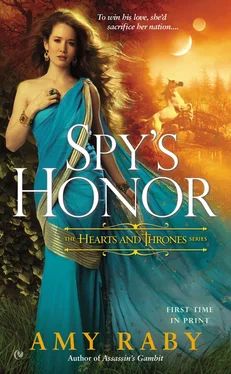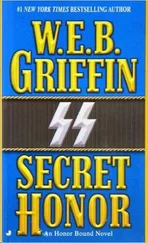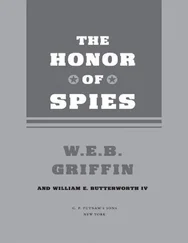Spy's Honor
Hearts and Thrones - 2
by
Amy Raby
To Mom and Dad, who sent rockets into space and also launched a daughter
First, thank you to my editor, Claire Zion, and my agent, Alexandra Machinist, for believing in these books and for making them so much better.
Working nearly three thousand miles away, on the opposite coast, I don’t have the privilege of personally meeting everyone, so thank you to all the wonderful people at Penguin and at Janklow & Nesbit. Collectively, they transformed a gangly collection of bits from my computer into a finished, polished novel.
To my family: sorry for always making you turn off your videos so I can write without distraction. You don’t need to watch those videos anyway!
To Angie Christensen: thank you for the myriad ways you’ve been helpful. You made it possible for me to keep up with the kids’ activities and still meet my deadlines. And to JoAnn Ten Brinke, thank you for being my walking buddy and motivating me to get out of the house every morning.
This book has been through multiple incarnations, each time critiqued by a different set of beta readers. Thank you to my first readers, Jessi Gage and Julie Brannagh of the Cupcake Crew, for your insightful critique, lovely conversation, and valued friendship.
Thank you also to my second readers, from Writer’s Cramp: Barbara Stoner, Mark Hennon, Kim Runciman, Stephen Merlino, Steven Gurr, Tim McDaniel, Amy Stewart, Thom Marrion, Janka Hobbs, Marta Murvosh, Michael Croteau, Kirsten Underwood, and Courtland Shafer. Each person in this group brings a different strength, whether it’s structural editing, line editing, or detailed knowledge about some specific subject. Nothing gets past Cramp!
And to my online critiquers: Marlene Dotterer, Bonnie Freeman, Kelly Jones, Olivia Fowler, Lisa Smeaton, John Beety, Tara Maya, Heidi Kneale, and Jarucia Jaycox Narula—thank you all for making this a better book.
The guards dragged open the double doors, and Rhianne swept into her cousin’s sitting room. “Is the council over? I need your fifteen tetrals.”
Lucien whirled on his wooden leg, jumpy as a winter partridge. He wore his imperial garments, the silk syrtos and thin jeweled loros that marked him as the son and heir of the Kjallan emperor. His dress suggested he’d only just returned from the council or was about to head out again, since he never wore the loros in his private chambers except to receive important visitors. Rhianne could not blame him. As the emperor’s niece, she possessed a similar garment and found its weight onerous. Lucien, whose left leg had been amputated below the knee and who walked with the aid of a crutch, probably liked it even less.
He glanced at the door. “This is a bad time.”
She could see that it was. Lucien had neither retreated to his Caturanga board for a war game nor settled on one of the many chairs and couches in his finely appointed sitting room to read one of Cinna’s treatises on battle tactics. He was standing in the middle of the room and seemed to be waiting to receive someone, and she was not that someone. She glanced back at the door, but aside from the guards, she and Lucien were alone. “I only need the tetrals. Hand them over and I’ll go. We can talk later.”
Lucien frowned. “This business with the money—it has to stop.”
Rhianne straightened her shoulders. He’d never balked over this before. “We agreed to it. Fifteen tetrals from each of us. And besides—”
“There are more important things going on right now.” Lucien’s eyes went anxiously to the door. “And I can’t afford to upset him any more than I already have.”
“Who? His Royal Unreasonableness?”
Lucien grimaced. “We should stop calling him that.”
Rhianne smiled sadly. Lucien was trying so hard to grow up, and he seemed to forget sometimes that she, three years senior to his tender seventeen, already had. And she wasn’t leaving without her tetrals. “How am I supposed to come up with the full amount if you don’t pay your share? When you’ve got an obligation to somebody, you don’t walk out on that obligation because something else comes up—”
“It’s not just me,” snapped Lucien. “Your name came up at the council meeting.”
She couldn’t imagine why. It was a war council, and why should anyone, in the context of talking about the war with Mosar, bring up the emperor’s niece? She was royal, but from a side branch of the family with a somewhat questionable pedigree. She wasn’t important the way Lucien was.
“Well,” thundered a voice from the doorway. “If it isn’t our yapping dog from the War Council.”
Rhianne, recognizing the deep tones of her uncle the emperor, sank into a welcome-curtsy. She glanced at Lucien long enough to see him steel his expression and bow to his father.
“Emperor,” said Lucien coolly.
Now she understood why Lucien was off-color. He and Florian were about to have a fight, and in these frequent and unavoidable conflicts, the son always fared worse than the father. She ought to have left when Lucien told her to. “I’m sorry to intrude,” she said. “I’ll leave you to your privacy.”
“No, no,” said Florian, his eyes on Lucien. Though the emperor and his heir were cut from the same cloth, the resemblance one noted on first glance was superficial. They shared the same black hair, black eyes, and aquiline profile, but Florian was broader, and taller by several inches. Florian reminded Rhianne of an eagle, with his sharp eyes, craggy nose, and severe face. His two elder sons might have been stamped woodcut copies, their resemblance to Florian was so strong, but Lucien and his sister, the two youngest, with their slighter builds and finer features, took after their late mother. Lucien was handsomer and smarter than his father, but Florian had never forgiven him for losing his leg to a trio of Riorcan assassins or for becoming his only choice of heir when the assassins had also murdered Lucien’s elder brothers.
“Stay,” Florian now said to Rhianne. “I should like to hear your opinion of a son and heir who openly criticizes his father in a council of war.”
Rhianne winced. “Well, without knowing the particulars—”
“Father,” Lucien broke in, “it is a private council, and its purpose is the discussion of strategy. If the council members cannot speak their minds—”
Emperor Florian backhanded him, hard, across the face. Lucien cried out, and his crutch clattered to the ground. Bodyguards, both Florian’s and Lucien’s, stiffened, ready for action, but nobody touched the pair.
“The legati are there to speak their minds,” hissed Florian. “ You are there as a courtesy. Your purpose on the council is to agree enthusiastically with everything I say. Is that clear?”
Lucien nodded. Limping on his wooden leg, he recovered his crutch and straightened his syrtos. His hand moved instinctively to his face, a protective gesture, but then dropped back to his side. Florian tolerated nothing he could interpret as a sign of weakness.
“Rhianne understands—don’t you, my dear?” said Florian. “We have enemies, and to protect ourselves, we must present a united front. Family solidarity. Isn’t that right?”
“Absolutely,” said Rhianne. “But when Lucien led White Eagle battalion in Riorca, he was regarded as a brilliant military tactician. If the War Council isn’t the right place for his ideas to be heard, perhaps there is another place?”
Florian laughed. “You were right the first time, when you said you needed to know the particulars. This idea of your cousin’s was practically treason. He wants us to call off the war with Mosar.”
Читать дальше












